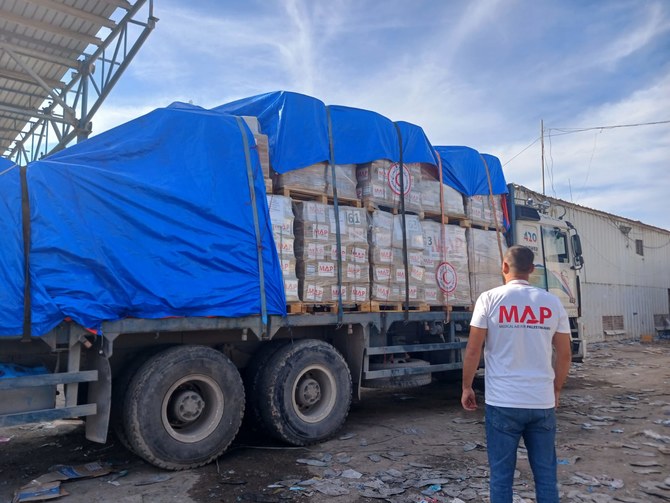JEDDAH: For over two months, the world has watched in utter horror as more than 20,000 Palestinians have been killed, over 50,000 injured and millions displaced in the Gaza Strip due to Israel’s relentless bombardment. The situation spiraled out of control in the early days of the war and the enclave’s already frail healthcare system collapsed almost immediately. But hope is on the way.
One hospital after another went out of service as missiles struck some of Gaza’s largest and most specialized facilities, bringing doctors and health care workers to their knees trying to save the lives of the injured. The scenes have become ever so prevalent now; bodies of children charred or riddled with shrapnel, body parts collected in bags and lifeless victims laying on floors as stretchers are needed for the living. The scenes coming from Gaza cannot be more horrid.
For the past few months, overwhelmed doctors treating victims needed to resort to performing surgeries and amputations without anesthesia, disinfectant or drugs. With no end in sight, supplies have dwindled and less than a quarter of the enclave’s 35-36 hospitals and 72 primary healthcare centers are in operation, but the international community has not abandoned the people of Gaza.
Coinciding with the season of giving, hundreds of aid groups and charities, and millions of people have protested the war on Gaza and gathered funds to help Palestinians.
Responding to the emergency, London-based charity Medical Aid for Palestinians launched a campaign to collect and deliver medical aid. Officials told Arab News that the charity is working with the Health Ministry in Gaza and delivering medical aid to its warehouses. The aid is then distributed to facilities in southern and central Gaza, including Nasser Hospital and European Gaza Hospital in Khan Younis, Shuhada Al-Aqsa Hospital in the Middle Area and Abu Yousef Al-Najjar Hospital in Rafah.

Responding to the emergency, London-based charity Medical Aid for Palestinians launched a campaign to collect and deliver medical aid. (Supplied/MAP)
So far, more than $1 million worth of medical supplies have been gathered and a second convoy has been dispatched to deliver over $500,000 worth of essential aid to hospitals in Gaza’s south.
“Fourteen trucks have already been sent into Gaza, and we plan on sending more,” Fikr Shalltoot, MAP’s Gaza director, told Arab News. “Two food trucks are queuing right now and we hope this will cross within the next few days. These trucks include food, water and some non-food items including mattresses and blankets, and this is mainly to support the team in Gaza and distribute to those in need in the shelters.”
The charity is now procuring medical supplies for trauma and primary healthcare centers specializing in hematology, oncology and hemodialysis, among others. About 15 trucks are expected to bring the much-needed aid to Gaza.
MAP is also cooperating with a number of organizations including Save the Children, IRC and Shelterbox to forward drugs and medical supplies to Al-Arish. The charity’s team on the ground will be responsible for delivering the aid through Rafah and distributing it to different hospitals inside Gaza.
“We’re closely coordinating with the Egyptian Red Crescent society and they’ve kept us informed with the movement of the trucks passing through Rafah, in order to relay to our team on the ground to meet the trucks at the Palestinian side. They’ll then either deliver to the key warehouses or directly to the hospitals,” Shalltoot said.
“We’re also working with other healthcare centers not affiliated with the Ministry of Health including the Palestinian Medical Relief Society, Culture and Free Thought Association, Abdel-Shafi Association and a number of other health care centers and local NGOs in order to support the provision of primary healthcare at the shelters and locations where the internally displaced people are.”
In the UK, MAP is continuing to focus on influencing decision-makers through sustained advocacy and campaigning. The charity’s goal is to secure a swift and lasting ceasefire.
MAP is engaging with both the UK government and opposition parties within Britain, calling on its supporters to reach out to MPs and urge for a definitive end to Israel’s hostilities.




























